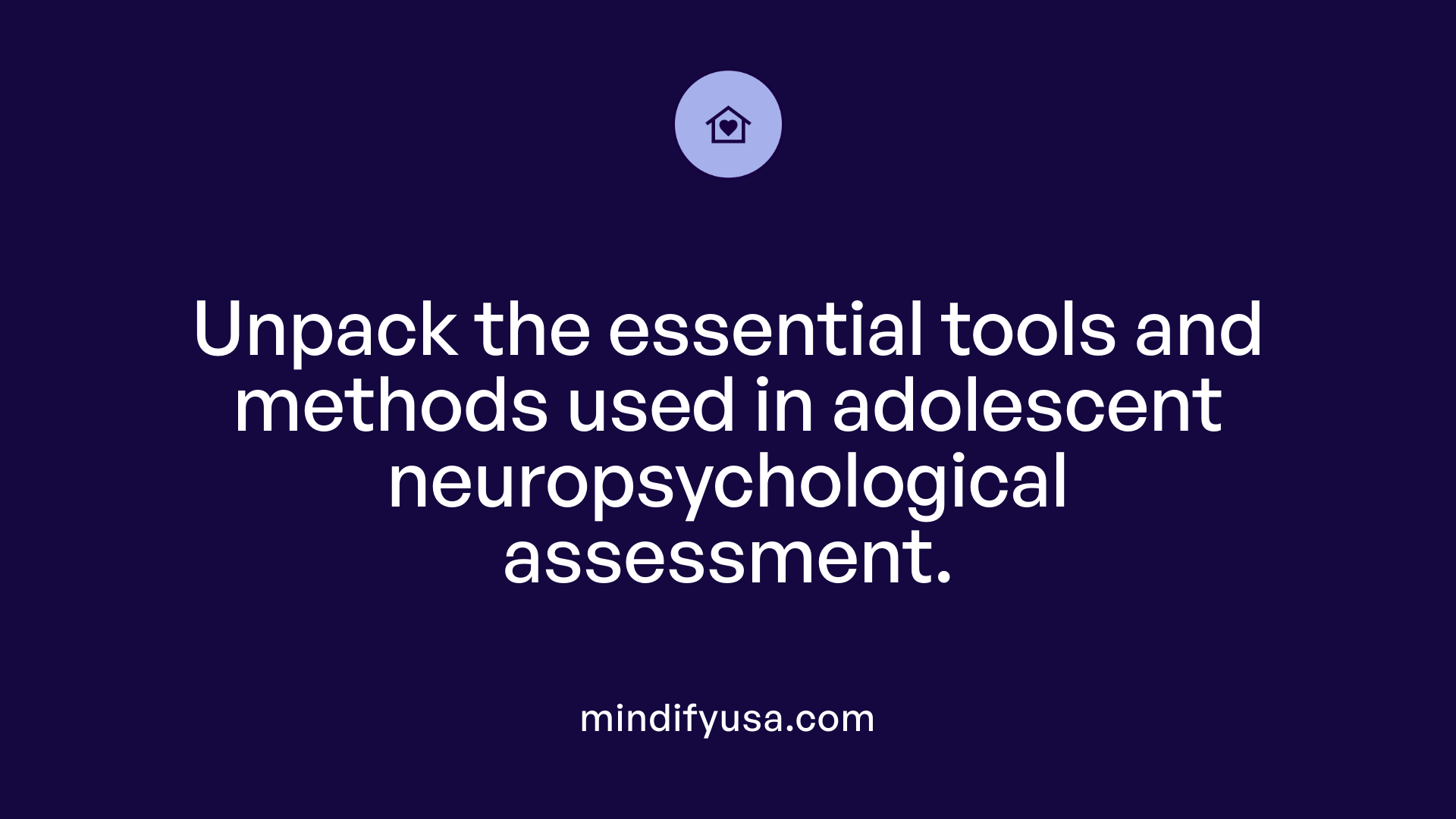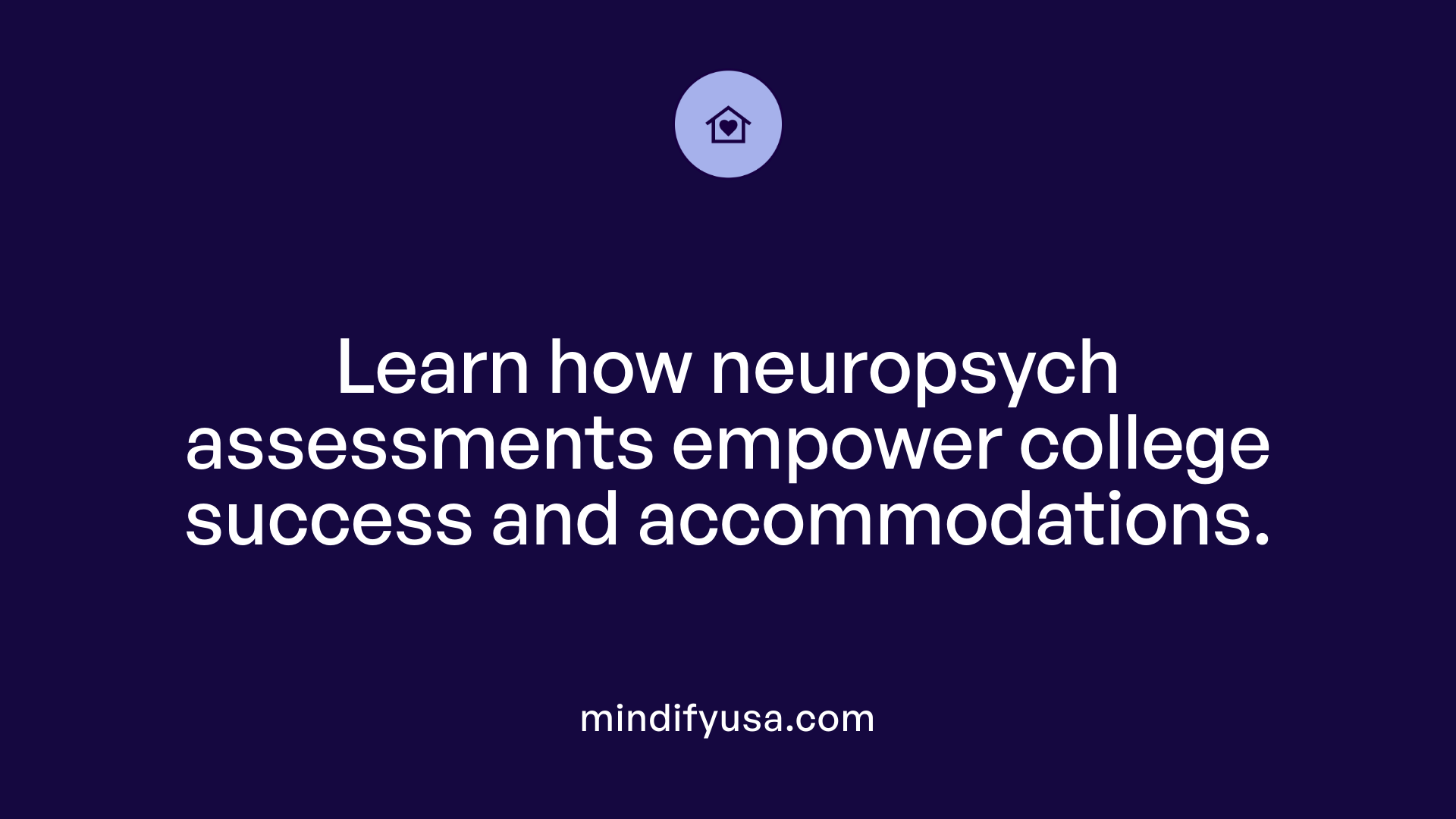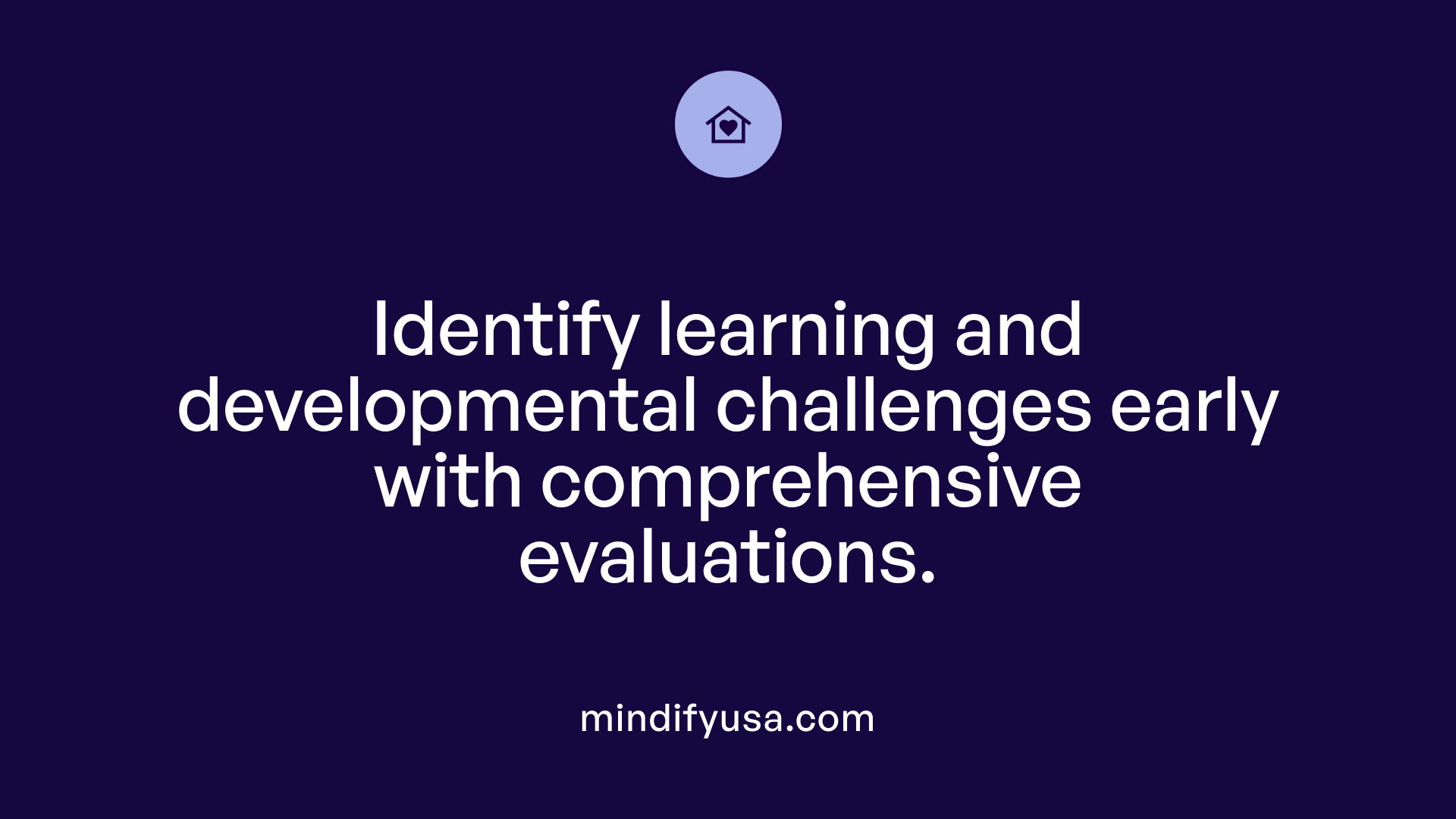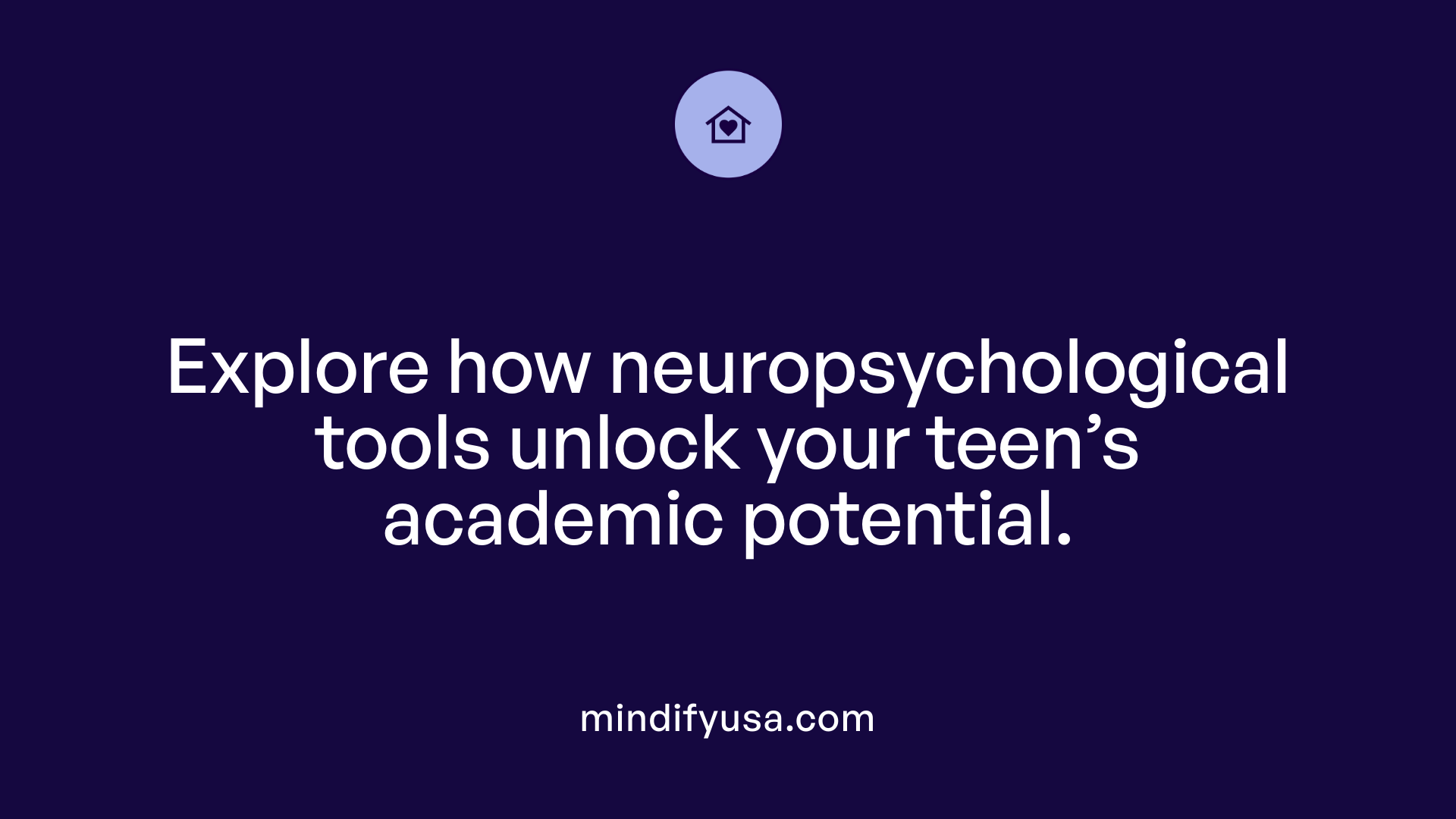Enhancing Academic Success Through Neuropsychology
Neuropsychological tools and methods play a pivotal role in understanding and supporting adolescent learning and development. By evaluating a teen’s cognitive, emotional, and behavioral functioning, these assessments inform personalized educational strategies, helping students reach their full potential during their critical developmental years. This article explores the wide array of neuropsychological evaluations, their applications in academic planning, and the vital role they play in diagnosing learning challenges and shaping effective support systems.
Neuropsychological Assessment Tools and Methods for Adolescents

What are neuropsychological assessment tools and methods used for in adolescent academic planning?
Neuropsychological assessment tools and methods serve a vital role in understanding an adolescent’s overall cognitive, emotional, and behavioral health. These assessments help identify the strengths and difficulties that can impact their learning and daily functioning.
The evaluations are comprehensive and involve multiple approaches conducted by trained neuropsychologists. They include standardized testing, clinical interviews, questionnaires, and observational methods. These tools provide detailed insights into various brain functions, such as memory, attention, language, executive skills like planning and organizing, visuospatial abilities, and motor coordination.
A typical test battery may encompass specific assessments tailored to each individual’s profile. For example, some assessments focus on academic skills like reading and math, while others evaluate cognitive processes such as processing speed or problem-solving abilities.
One example of a rapid assessment tool is the K-SNAP, which takes about 30 minutes to administer and is suitable for adolescents aged 11 and older. It can provide quick insights into cognitive functioning or be part of a larger, more detailed evaluation.
The primary goal of these assessments is to detect learning disabilities, attention or behavioral issues, emotional challenges, or developmental delays. By pinpointing these areas, professionals can develop personalized educational strategies, behavioral interventions, or accommodations.
The information gained from neuropsychological evaluations guides educators, clinicians, parents, and the adolescents themselves. It helps craft tailored support plans to enhance learning outcomes and emotional well-being.
In summary, neuropsychological assessment tools are essential in adolescent academic planning as they provide a detailed picture of brain functioning. This enables targeted interventions that support academic success, personal development, and long-term well-being.
| Assessment Area | Examples of Tools & Methods | Purpose/Details |
|---|---|---|
| Standardized Testing | Memory, attention, language, executive function tests (e.g., WISC, NEPSY) | Measure core cognitive areas against normative data |
| Clinical Interviews & Questionnaires | Behavioral ratings, emotional checklists, and self-report tools | Gather subjective info on behavior, mood, and social skills |
| Observational Methods | In-school observations, behavioral monitoring | Observe real-life functioning and response to tasks |
| Domains Assessed | Memory, attention, language, executive functions, visuospatial skills | Identify specific areas of strength and difficulty |
This comprehensive approach facilitates accurate diagnosis and effective support strategies, enabling adolescents to reach their full potential in both academic and personal contexts.
How Neuropsychological Evaluations Support College-Bound Students

How can neuropsychological evaluations support college-bound students and their academic development?
Neuropsychological evaluations are invaluable tools for college-bound students navigating the transition from high school to higher education. These comprehensive assessments identify specific cognitive strengths and challenges, offering a detailed profile of an individual’s learning and thinking abilities.
For students with attention deficit hyperactivity disorder (ADHD), learning disabilities, or other neurodevelopmental and emotional conditions, these evaluations provide important documentation. They help justify the need for accommodations in college, such as extra time on tests, quiet testing environments, or assistive technologies like note-taking services. Having recent, standardized evaluation results (usually within the last three years) is often a requirement for accessing these supports.
The assessments cover a broad range of functions including intellectual ability, reasoning, memory, visual processing, language skills, and executive functions like planning, organizing, and managing time. This comprehensive profile enables colleges to understand how a student processes information and handles academic tasks.
With clear, data-driven insights from neuropsychological testing, students and educators can develop tailored strategies. These may include specific study techniques, behavioral interventions, or environmental modifications, all aimed at enhancing academic success and personal growth.
Furthermore, such evaluations can reveal underlying issues that might interfere with college adjustment, such as emotional regulation or social interaction difficulties. Recognizing these early allows for targeted support services, encouraging better mental health and social integration.
Effective support begins with detailed evaluation. The process typically involves several hours of testing and interviews, with results summarized in reports shared with students, families, and college disability support offices. This collaboration ensures that students receive appropriate resources and are empowered to meet their academic goals.
In summary, neuropsychological assessments serve as a foundation for individualized support plans, helping students leverage their strengths while addressing challenges. This proactive approach facilitates not only academic achievement but also the development of essential life skills needed for success beyond college.
| Aspect of Evaluation | What it Measures | How It Supports Students | Additional Notes |
|---|---|---|---|
| Cognitive Strengths | Memory, reasoning, language | Identifies strengths to build confidence | Tailors learning strategies |
| Academic Skills | Reading, writing, math | Guides classroom accommodations | Supports tailored tutoring |
| Executive Functions | Planning, time management | Enhances organizational skills | Can inform technology use |
| Emotional and Behavioral | Mood, emotional regulation | Addresses mental health needs | Promotes well-being |
| Social Skills | Interaction, social cognition | Supports social integration | Directs social skills training |
Overall, neuropsychological evaluations are critical in equipping college-bound students with the necessary tools and support systems to excel academically and personally in their higher education journey.
Diagnosing Learning and Developmental Challenges in Teens

What role do neuropsychological assessments play in diagnosing learning disorders and developmental challenges in teens?
Neuropsychological assessments are essential tools in understanding the complex cognitive, behavioral, and emotional profiles of teenagers facing learning or developmental difficulties. These evaluations involve a series of standardized tests and observations designed to measure various brain functions essential for learning and daily life.
Through comprehensive testing, clinicians assess areas such as memory, attention, language skills, visual-spatial abilities, and executive functions like planning, organizing, and managing time. This helps identify specific strengths and weaknesses, providing a clear picture of how a teen's brain processes information.
By comparing a teen’s performance to age-matched peers, professionals can detect subtle neurocognitive impairments that might not be obvious during routine classroom assessments. This comparison helps in reaching accurate diagnoses, such as learning disabilities, ADHD, autism spectrum disorder, or emotional regulation issues.
The profile generated from these tests informs tailored interventions. For example, if a teen demonstrates difficulties with working memory, specific strategies such as organization aids or memory exercises can be recommended. If attention regulation is an issue, behavioral techniques or academic accommodations may be suggested.
In addition, neuropsychological assessments can uncover co-occurring conditions like anxiety or depression, which often influence learning and behavior. Recognizing these issues allows for integrated treatment plans that address both learning challenges and emotional well-being.
Overall, these evaluations do more than diagnose; they provide a roadmap for supporting a teen's educational journey and personal development.
How does this assessment process work?
The process typically involves several components:
- An in-depth interview with the teen and parents or caregivers
- A series of objective, norm-referenced tests
- Questionnaires filled out by teachers and clinicians
- Observational assessments
Testing sessions usually last between 2 to 4 hours, often spread over multiple visits. The results are compiled into a detailed report that highlights strengths, weaknesses, and specific needs.
What areas are assessed?
The range of testing often includes:
| Domain | Purpose | Examples of Tests & Activities |
|---|---|---|
| Intellectual Functioning | Overall reasoning and problem-solving ability | IQ tests, aptitude assessments |
| Learning and Memory | How well a teen retains and recalls information | Memory tasks, story recall tests |
| Attention and Executive Functions | Focus, planning, organization, impulse control | Continuous performance tests, problem-solving puzzles |
| Language Skills | Verbal reasoning and comprehension | Vocabulary, naming, listening comprehension tests |
| Visual-Spatial Skills | Understanding spatial relationships and visual info | Block design, puzzles, drawing tasks |
| Emotional and Behavioral Health | Emotional regulation, stress response | Questionnaires, clinical observations |
The impact of neuropsychological evaluations
Results from these assessments guide educational planning through personalized strategies, such as individualized education programs (IEPs) or 504 plans. They can recommend classroom accommodations, behavioral therapies, and specific learning supports.
Early identification of learning and developmental challenges allows for timely intervention, increasing a teen’s chances of academic success and social-emotional growth. The assessments also serve to monitor progress over time, ensuring interventions remain effective.
Why consider an assessment?
Signs that a teen might benefit from neuropsychological testing include persistent academic struggles, difficulty focusing, memory issues, or behavioral problems affecting school and social life.
More information regarding neuropsychological diagnosis of teen learning disorders can be found by searching “Neuropsychological diagnosis teen learning disorders” online. Accessing such resources can help parents and educators understand the importance and scope of these evaluations, ensuring that teens receive the support they need to thrive.
Understanding a Teen’s Cognitive Profile for Academic Planning

How do neuropsychological tools assist in understanding a teenager’s cognitive profile for better academic planning?
Neuropsychological assessments play a vital role in providing a detailed look into a teenager’s brain functions, which directly influences their academic performance. Tools such as the NEPSY-II, KABC-II NU, and WISC-V are standardized tests designed to evaluate core cognitive skills, including memory, attention, and processing speed. These assessments are administered by qualified neuropsychologists through a combination of interviews, questionnaires, observational techniques, and direct testing.
By analyzing results from these assessments, clinicians can identify specific cognitive strengths and weaknesses. For example, a teen may excel in verbal reasoning but face challenges with processing speed or working memory. Understanding these nuances helps educators and parents tailor support strategies, such as extended time on tests, simplified instructions, or targeted skill-building exercises.
The evaluation process also incorporates emotional, behavioral, and social factors, providing a comprehensive profile of the teen’s functioning. This holistic approach ensures that interventions address not only academic difficulties but also related emotional or attention-related issues.
The insights gained from neuropsychological testing enable tailored educational strategies that promote independence and confidence. For instance, if a teen exhibits deficits in attention regulation, specific behavioral interventions and accommodations can be implemented.
Ultimately, these tools foster effective academic planning by delivering an accurate, detailed understanding of a teen’s mental processes. This personalized approach helps support their overall development, ensuring that educational environments adapt to their unique needs and help them reach their full potential.
| Assessment Area | Key Tests | Purpose and Use | Typical Age Range |
|---|---|---|---|
| Memory | WISC-V, NEPSY-II | Identifies strengths and support needs in learning and recall | 5-16 years |
| Attention | Conners’ Continuous Performance Test (CPT), WISC-V | Assesses focus, distractibility, and attention span | 6-18 years |
| Processing Speed | WISC-V, KABC-II NU | Measures how quickly a teen can process information, impacting academic fluency | 5-16 years |
| Language & Executive Function | NEPSY-II, WISC-V | Evaluates verbal skills, problem-solving, and planning abilities | 5-16 years |
Why choose a comprehensive neuropsychological assessment?
A full evaluation provides invaluable insights into how a teenager’s brain processes information, handles tasks, and interacts emotionally. These assessments can identify subtle learning difficulties early, allowing for timely support that maximizes academic success and emotional resilience.
Engaging in neuropsychological testing helps create a supportive, individualized educational environment. It empowers both students and their support systems with the knowledge needed to foster greater achievement and well-being.
The Significance of Neuropsychological Assessments for Educational Strategies

What is the significance of neuropsychological assessments in developing educational strategies and accommodations like IEPs and 504 plans?
Neuropsychological assessments are vital tools in crafting effective educational strategies and support plans for students with learning challenges. These evaluations provide a detailed understanding of a child's cognitive, emotional, and behavioral functioning by identifying their individual strengths and weaknesses across multiple domains such as memory, attention, language, processing speed, executive functioning, and social skills.
By examining how a child processes information and manages tasks, neuropsychologists can pinpoint specific learning disabilities or neurodevelopmental conditions that may hinder academic performance. For example, assessments might reveal issues with reading, math, or writing, or more subtle challenges like difficulties with reasoning or visual processing. This level of detailed insight ensures that educational interventions are not based on assumptions but are tailored to the child's actual needs.
In the context of special education planning, these assessments are crucial for developing and implementing Individualized Education Plans (IEPs) and 504 plans. They provide the evidence needed to justify accommodations such as extended time on tests, alternative response methods, quiet testing environments, or modifications to assignments. Moreover, the documented difficulties support eligibility for various accommodations aimed at leveling the playing field for students who experience challenges due to neuropsychological conditions.
Additionally, these evaluations help educators and clinicians design targeted interventions that address specific deficits, whether through specialized teaching strategies, behavioral therapy, or tools like assistive technology. When aligned with assessment findings, intervention plans can foster a more inclusive classroom environment and promote academic success.
A well-conducted neuropsychological assessment also serves as a foundation for ongoing support. It helps monitor the child's developmental progress over time and adjust strategies as needed, especially during critical educational transitions such as moving from elementary to middle school or high school.
Overall, understanding a child's unique cognitive profile through neuropsychological testing is fundamental in creating effective, personalized education plans that promote equity, support learning, and enhance the child's confidence and independence in school.
| Aspect | Details | Additional Notes |
|---|---|---|
| Purpose | Identify strengths, weaknesses, and needs | Guides educational planning and accommodations |
| Common Domains Assessed | Memory, attention, language, executive functions, social skills | Highlights areas requiring support |
| Typical Outcomes | Development of IEPs and 504 plans, tailored interventions | Ensures support matches child's profile |
| Benefits | Improved academic performance, self-esteem, independence | Enables effective learning support |
| Follow-up | Re-evaluation during educational transitions | Maintains relevant support |
How do tailored educational interventions improve learning outcomes?
Tailored interventions are designed to address the specific challenges identified through neuropsychological assessments. For example, a child with working memory difficulties may benefit from strategies like simplified instructions, use of visual aids, or memory devices. Students with attention regulation issues might respond well to structured routines, frequent breaks, or assistive technologies. Children with language processing challenges may require speech therapy or alternative communication strategies.
Implementing interventions that align directly with a child's profile helps maximize their potential. It minimizes frustration, builds confidence, and fosters a more engaging learning experience. Custom plans also facilitate communication among teachers, parents, and specialists, ensuring consistency and reinforcement of strategies across settings.
By continuously monitoring the child's progress and making adjustments based on ongoing assessments, educators can maintain an effective support system. These personalized approaches play a crucial role in leveling the educational playing field, enabling children with diverse learning needs to succeed academically and develop essential life skills.
In conclusion, neuropsychological assessments are invaluable in understanding the complex cognitive and behavioral tapestry of each student. They serve as a foundation for precise educational planning and intervention, ultimately aiming to create supportive learning environments tailored to individual needs.
Evaluation Procedures and Services for Children and Teens
What are common neuropsychological evaluation procedures and services available for children and teenagers?
Neuropsychological assessments for children and teenagers are comprehensive evaluations conducted by licensed neuropsychologists. These assessments aim to understand a child's cognitive, emotional, behavioral, and social functioning. The procedures typically involve standardized tests that are tailored to the child's age, developmental level, and specific concerns.
The assessment process begins with clinical interviews involving the child and their caregivers, such as parents, teachers, or other guardians. These interviews help gather detailed information about the child's developmental history, behavioral patterns, academic performance, and emotional well-being. In addition, neuropsychologists review medical and educational records to contextualize test results and better understand the child's background.
During testing sessions, which usually last between two to three hours, children engage in a variety of tasks designed to measure different brain functions. These include tests of attention, memory, reasoning, language skills, visuospatial abilities, and executive functions like planning and organization. The assessments may involve paper-and-pencil activities, puzzles, computer-based tasks, and observational measures. For very young children or those with specific needs, assessments are adapted to be engaging and age-appropriate to maintain cooperation and obtain meaningful results.
The evaluation process also includes questionnaires or checklists completed by parents, teachers, and sometimes the children themselves, offering additional insights into daily functional behaviors and emotional regulation. Throughout the assessment, neuropsychologists observe the child's responses, behavior, and effort to ensure accuracy and to identify any emotional or behavioral issues that may influence test outcomes.
After completing the testing, neuropsychologists analyze the data to develop a detailed profile of the child's strengths and weaknesses across various domains. They interpret the results in relation to normative data, considering factors like age and background. The findings are synthesized into comprehensive reports that highlight key issues, offer diagnoses if applicable, and provide tailored recommendations. These recommendations may include academic accommodations, behavioral interventions, therapy referrals (such as speech or occupational therapy), or further testing if necessary.
Results from these evaluations are essential for guiding educational planning and support services. They aid in creating individual education plans (IEPs), 504 plans, or other accommodations that help children succeed in school and daily life. Moreover, the reports serve as valuable tools for parents, teachers, and clinicians to develop effective intervention strategies, monitor progress over time, and support the child's developmental trajectory.
In summary, neuropsychological evaluations for children and teens combine clinical interviews, standardized testing, questionnaires, and observations to produce a thorough understanding of the child's functioning. These procedures are crucial in identifying learning challenges, developmental delays, or neurodevelopmental conditions and in shaping personalized support systems to foster growth and success.
Advancing Teen Learning Through Precision Assessment
In summary, neuropsychological assessments are invaluable tools in adolescent educational planning, offering deep insights into individual cognitive, emotional, and behavioral profiles. These evaluations support early detection of learning disabilities, emotional challenges, and developmental delays, enabling tailored interventions and accommodations. By providing clear, data-driven profiles of teens’ strengths and weaknesses, neuropsych tools empower educators, clinicians, and parents to create personalized learning strategies, foster independence, and promote academic success. As the field continues to evolve, integrating neuropsychological assessments into standard educational practice becomes essential to supporting teens in reaching their academic and life potential.
References
- Neuropsychological Testing & Educational Evaluation
- Neurocognitive Assessments | List of Neuro & Cognitive Tests
- An In-Depth Look Into Neuropsychological Assessments
- Neuropsychological Testing in the Transition to Adulthood
- How to Get an Independent Neuropsychological Evaluation
- Neuropsychological Assessments for Children
- Neuropsychology Services - UIC Department of Psychiatry






































































































